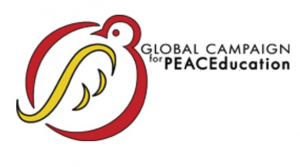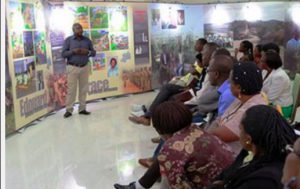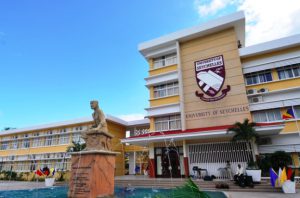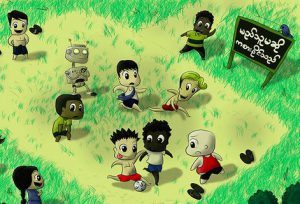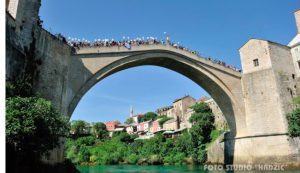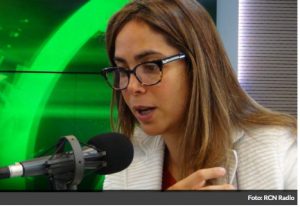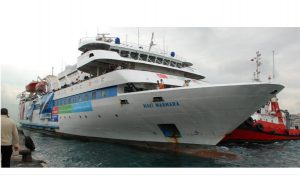DISARMAMENT & SECURITY .
An article by the Stop Ramstein Campaign (translated from the German)
It was the largest protest against drone operations, it was the largest actions of education and information in the history of decades of protest against the US military base in Ramstein. We have changed the mood in the region in favor of peace. This is the summary of our activities in Ramstein from June 9-12, 2016. The actions were young. It was also great to see longstanding activists again.
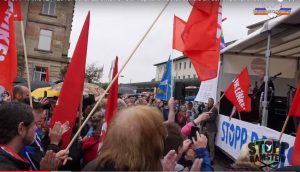
Click on photo to enlarge
5,000 people in the pouring rain formed a human chain through the villages to the Ramstein Air Base and the final rally at the roundabout just outside the base. Apart from a few small gaps people were hand in hand for a10-kilometer human chain. The persistent rain prevented an even greater participation. The final manifestation in front of the Air Base brought out all the optimism, the color, the diversity and creativity of the 5,000 participants. Here the power of this new movement was impressively visible. Their optimism and commitment will continue to work in the future. The participation of Oskar Lafontaine and Tabea Rößner (MP Alliance ’90 / The Greens) underlined the political importance of these actions.
In the public event on Friday evening in the Church of Reconciliation, more than 600 people participated along with Willy Wimmer and Albrecht Müller. The church was packed. The discussion expressed a resounding no to war, drones and nuclear weapons and a passionate appeal for a new cooperative relationship with Russia. The experiences of two great political men culminated in their statement: “Let us not make Russia the enemy again.”
In the peace camp, more than 500 participants came together for discussions which generated the logistical problems that it was too crowded, despite persistent rain. The camp was perhaps the highlight of the entire weekend. The atmosphere was active, colorful, open and committed, despite the rain. The promise “We’ll be back next year and bring many others with us” underscored the optimistic general message. The area for the camp was provided by a local farmer free of charge and infrastructure was provided by local residents. This would have been unthinkable years ago and highlights the change in climate locally.
The events of the Information Day on Friday were also overcrowded. When has there been in Kaiserslautern events of socially controversial issues, which were crowded with the more than 150 participants in one afternoon? Among the issues discussed were the future of NATO, the drone war and how these can be overcome as well as the concurrent Bilderberg Conference in Dresden.
10,000 leaflets and other information material were distributed to the local population. In recent months, public awareness has changed massively in favor of peace. Along the route of the human chain there was participation by local people despite the fact that it had not been advetised.
For the first time international guests from a number of countries participated in the human chain, including the US, UK, France, Switzerland, Belgium, Luxembourg and Austria, which underlines the importance of these actions.
The film “Ramstein, final assault”, with the significant support from peace activists and complainants against the US Air Base, was shown by Wolfgang Jung and Fee Strieffler on Friday in Kaiserslautern.
There have already been over 10 regional “Stop Ramstein initiatives” across the country and there were 13 buses full of people who came to Ramstein.
“We call on our federal government to end this violation of international law, this warfare by the United States government that is conducted from our soil,” said Oskar Lafontaine, the opening speaker at one of the three opening rallies.
(Article continued in right column)
Drones (unmanned bombers), Should they be outlawed?
(continued from left column)
The speakers highlighted the main concerns of the demonstrators:
* Stop the drone war!
* Close the Air Base with its central command structures, including for nuclear war and missile defense
* Establish a comprehensive conversion program by which military jobs are converted to civilian.
* End the German participation in wars of intervention as well as the armament programs
The protesters expressed their solidarity with the refugees who have come to us because of the wars of USA and NATO. “The daily death in the Mediterranean” is intolerable and a political and moral indictment of the policies of the Western countries.
Completely new and unexpectedly positive was the impressive, broad and diverse media coverage. Reuters produced a video clip that was shown on BILD.de and Stern online. The dpa and epd provided comprehensive information. There were reports by Deutschen Welle, the Frankfurter Rundschau, from FOKUS, n-tv, Deutschlandfunk, Deutschland Radio Kultur, Neuen Deutschland and many national newspapers. There were almost daily reports in the last week in the local monopoly newspaper Rheinpfalz. There were two major articles in the US newspaper of the region (Stars and Stripes), almost continuous radio reports and several regional TV reports (including SWR Landesschau). They can be viewed on the website of the campaign. Coverage in the young world was awkward.
The events and their intense preparation would have been inconceivable without the support of the new alternative media: NachDenkSeiten, KenFM, Weltnetz.tv, RT, alternative radio stations, among others. This cooperation promises to help foster other successful actions of the peace movement in the future; it should be developed and expanded.
Preparations for the actions were controversial, at times evoking malicious, even libelous attacks. But the events of the weekend proved them wrong. It was the peace movement in its breadth and diversity. The participants were united by their desire for peace, their concerns about the dangerous situation today and their opposition to the ruling policy, a clear NO to war and militarism.
It can only be an appeal, but it should be stated at this point: Let us develop more togetherness and solidarity! Ramstein June 2016 makes it clear.
The events were a major logistical and organizational challenge. They were many helpers, through the dedicated regional initiative “Stop Ramstein Kaiserslautern”. The small problems that we had, of course, will be overcome next time. Thanks to all who helped. There were many! Without them, the impressive actions of the weekend would have been impossible.
“We will return” until we end the drone operations from Ramstein. It is a long struggle that must be conducted with even greater intensity. We are ready! We must continue with our educational and information work and and further actions for peace among the people. The campaign “Stop Ramstein” has only just begun!
If this is the beginning of a revitalized, renewed peace movement, only time will tell. We are committed to remain active.
For further information, see www.ramstein-kampagne.eu
